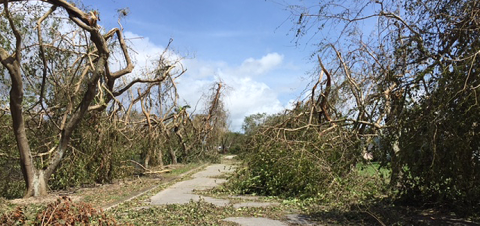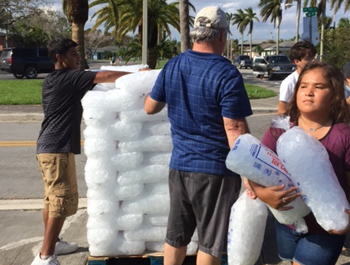Image

Seventy-two hours prior to the arrival of Hurricane Irma — then a Category 4 storm that had carved a destructive path through numerous Caribbean islands — staff members at Rural Neighborhoods Inc. (RNI) worked to shutter nearly 1,000 rental homes on Florida's west and east coasts and urged residents to evacuate.
RNI's portfolio includes 1,697 single-family, duplex and townhouse rentals developed at an estimated cost of $200 million throughout South Florida. More than 5,000 persons call RNI properties home, with their average household incomes ranging from $16,000 to $18,000 per year. In addition to affordable housing, RNI's portfolio includes four child care centers, a community health center, 10,000 square feet of retail and office space, and a 10-acre park.
Luckily, Hurricane Irma did not cause any structural damage to Rural Neighborhoods' developments. "Those in our affordable housing communities received clear information before the storm, tenant services staff ensured that residents in evacuation zones did as instructed as Irma approached, and our families returned to sound, habitable structures and a caring community in its aftermath," said RNI's President Steve Kirk.
However, Hurricane Irma did not leave the area unmarked.
"Tree debris in some places is unbelievable. At Everglades Village, our 120-acre campus in Florida City, more than 300 trees planted after Hurricane Andrew were toppled — blocking streets and crushing tot lots, but miraculously avoiding most buildings," said Kirk. "There also was modest damage to soffits, fascia and shingles throughout our portfolio, from one coast to the other. But, frankly, that's a good outcome based on the storm's ferocity and potential track."
As in many parts of Florida, the lack of power has been a particular hardship for residents. RNI spent more than $100,000 to replace spoiled goods in refrigerators and batteries in 4,000 smoke detectors to ensure they worked when power returned.

The organization also hired contractors for emergency removal of trees blocking roads and sidewalks. The next challenge is assisting poor residents who live in neighborhoods that surround RNI properties and thus lived in homes (especially in trailer parks) that could not withstand the wind and rain.
"There was fear and panic prior to the storm; some stayed in dangerous conditions and others had no habitable home to return to afterward, let alone advocates to coordinate delivery of food and necessities," said Kirk. "In Immokalee, one in four residents went home each night to a mobile home, which are often dilapidated and unsound. After Irma, trailers may appear OK from the street, but once you enter them, one finds water-logged floors and damaged roofs."
Rural Neighborhoods is committed to assisting the working poor recover from Hurricane Irma. Its commitment to rebuilding is rooted in its experience after a catastrophic Hurricane Andrew 25 years ago. According to its website, "We know firsthand it is gestures both large and small that bring hope to the devastated and begin the process of rebuilding. We will rebuild! That was the rallying cry that arose from the rubble of our neighborhood in 1992 (and from so many more communities since). It's also Rural Neighborhoods' commitment to communities struck by disaster that we have the privilege to serve. Rebuild we will — however long it takes."

